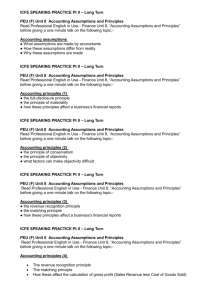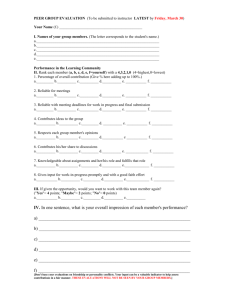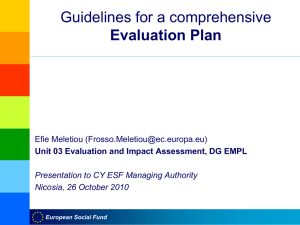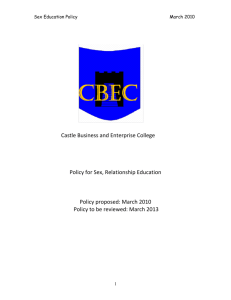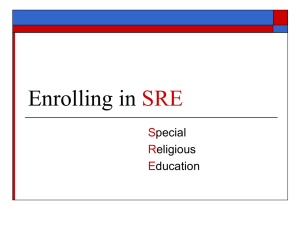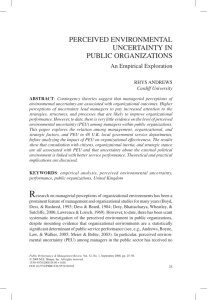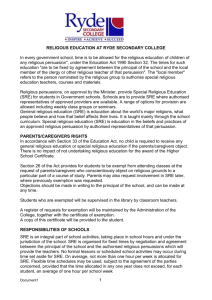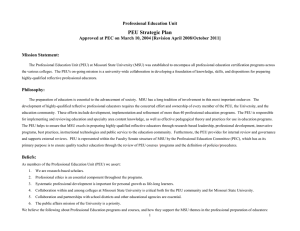FCO Evaluation Plan FY1213
advertisement
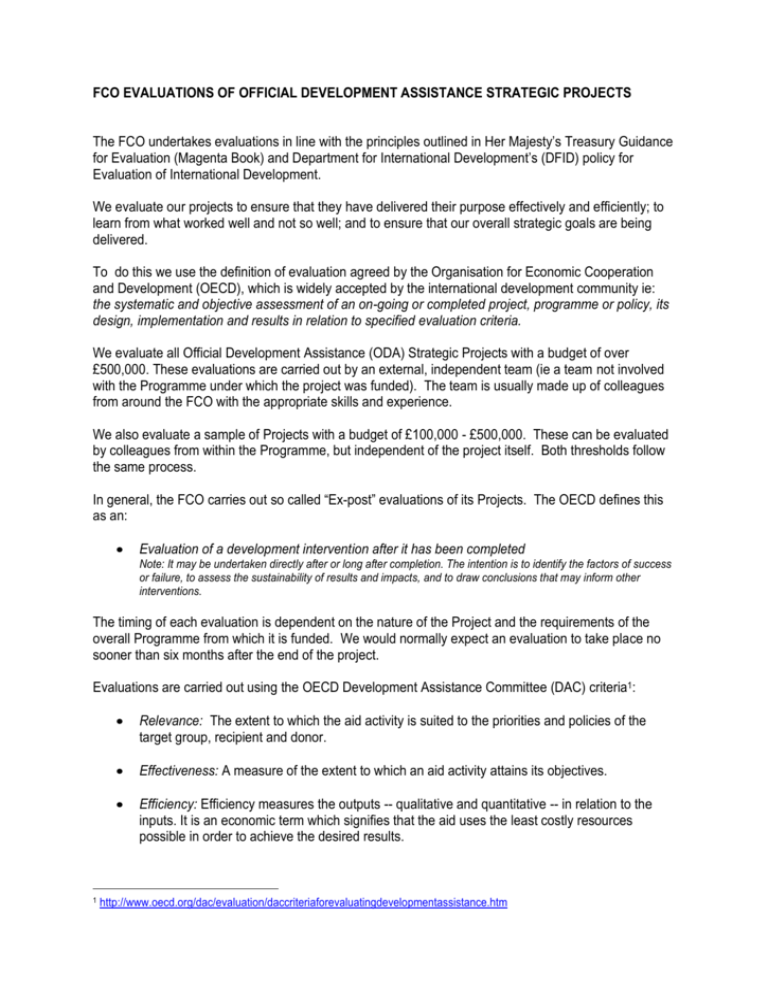
FCO EVALUATIONS OF OFFICIAL DEVELOPMENT ASSISTANCE STRATEGIC PROJECTS The FCO undertakes evaluations in line with the principles outlined in Her Majesty’s Treasury Guidance for Evaluation (Magenta Book) and Department for International Development’s (DFID) policy for Evaluation of International Development. We evaluate our projects to ensure that they have delivered their purpose effectively and efficiently; to learn from what worked well and not so well; and to ensure that our overall strategic goals are being delivered. To do this we use the definition of evaluation agreed by the Organisation for Economic Cooperation and Development (OECD), which is widely accepted by the international development community ie: the systematic and objective assessment of an on-going or completed project, programme or policy, its design, implementation and results in relation to specified evaluation criteria. We evaluate all Official Development Assistance (ODA) Strategic Projects with a budget of over £500,000. These evaluations are carried out by an external, independent team (ie a team not involved with the Programme under which the project was funded). The team is usually made up of colleagues from around the FCO with the appropriate skills and experience. We also evaluate a sample of Projects with a budget of £100,000 - £500,000. These can be evaluated by colleagues from within the Programme, but independent of the project itself. Both thresholds follow the same process. In general, the FCO carries out so called “Ex-post” evaluations of its Projects. The OECD defines this as an: Evaluation of a development intervention after it has been completed Note: It may be undertaken directly after or long after completion. The intention is to identify the factors of success or failure, to assess the sustainability of results and impacts, and to draw conclusions that may inform other interventions. The timing of each evaluation is dependent on the nature of the Project and the requirements of the overall Programme from which it is funded. We would normally expect an evaluation to take place no sooner than six months after the end of the project. Evaluations are carried out using the OECD Development Assistance Committee (DAC) criteria1: 1 Relevance: The extent to which the aid activity is suited to the priorities and policies of the target group, recipient and donor. Effectiveness: A measure of the extent to which an aid activity attains its objectives. Efficiency: Efficiency measures the outputs -- qualitative and quantitative -- in relation to the inputs. It is an economic term which signifies that the aid uses the least costly resources possible in order to achieve the desired results. http://www.oecd.org/dac/evaluation/daccriteriaforevaluatingdevelopmentassistance.htm Impact: The positive and negative changes produced by a development intervention, directly or indirectly, intended or unintended. This involves the main impacts and effects resulting from the activity on the local social, economic, environmental and other development indicators. The examination should be concerned with both intended and unintended results and must also include the positive and negative impact of external factors, such as changes in terms of trade and financial conditions. Sustainability: Sustainability is concerned with measuring whether the benefits of an activity are likely to continue after donor funding has been withdrawn. Projects need to be environmentally as well as financially sustainable. In addition the FCO will look at the overall management of the Project. The reports will highlight key lessons to be taken from the Project and will make recommendations for future work. Terms of Reference for each evaluation are agreed by the Programme Manager/SRO with the Evaluation Team prior to any work beginning. These set out clearly the management arrangements for the evaluation, including objectives; background; scope/issues to be studied; methodology; how the reports will be written and disseminated; and the key timings involved. Timetable for FCO ODA Project Evaluations This plan covers projects completed during FY 12/13. The planned dates for the evaluations are subject to local constraints, and could need revision. The reports will be published on .gov.uk within two weeks of the conclusion of the Evaluation. Programme Project Number Project Prosperity Programme PPY MEX 1003 Climate Action Plans for Mexican Municipalities Sustainable Forest Management in Turkey: Enhancing Implementation Capacity of General Directorate of Forestry Greenhouse Gas Emissions Management Appraisal and Inspection System for Chinese State-owned Enterprises Increasing Turkey’s Efficiency in Implementing National Policy Aimed at Combating Violence Against Women Strengthening of Legislative and Oversight Capacities of National Parliament of Serbia in the area of Economic Legislation - and Open Parliament PPY TUR 1009 PPY CHN 1015 Reuniting Europe Programme PEU SRE 000806 PEU SRE Cost of Project £153,000 Planned Evaluation Dates September 2013 £104,000 December 2013 £176,000 December 2013 £104,000 January 2014 £146,000 December 2013 PEU SRE 000803 PEU SRE 000731 PEU SRE 000717 PEU SRE 000719 PEU SRE 000715 PEU SRE Human Rights & PHR CHP Democracy Programme PHR KAA 121301 PHR BTG 120016 PHR MUL 220013 PRH VNH 111301 Arab Partnership Programme PNN APF Local Media on the EU Path Phase II (Turkey) Parliamentary Strengthening Programme (Montenegro) Targeting Gaps & Opportunities; Progress and momentum in BiH Rural Development (Bosnia & Herzegovina) Accountable government budgeting process (Bosnia & Herzegovina) Increasing Good Practice in the Albanian Parliament DIV RE Programme for Croatia (portfolio of projects) China Review of 12/13 Funding from Human Rights and Democracy Programme (7 projects) Kazakhstan Review of 12/13 Funding from Human Rights and Democracy Programme (5 projects) Enabling Zimbabwe Citizen Observers to Monitor the role of money in the General Election, followed by Advocacy Providing assistance to and strengthening legal restriction for prisoners under sentence of death (multi-country) Bring together NGOs, the media and government to implement legislations relating to protection of journalists and create a more enabling environment for the media to operation in Vietnam Pan-Arab Multi Platform Participative Media Debates and News Practitioner Capacity Building (Egypt, Jordan, Tunisia, Morocco, Algeria) £105,000 January 2014 £152,000 February 2014 £111,000 October 2013 £127,000 October 2013 £108,000 November 2013 £519,000 July 2013 £610,000 September 2013 £211,000 February 2014 £198,000 December 2013 £183,000 December 2013 £125,000 December 2013 £1.2m December 2013



